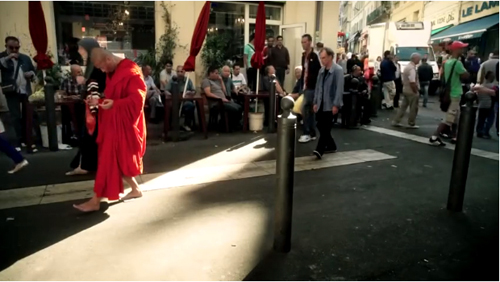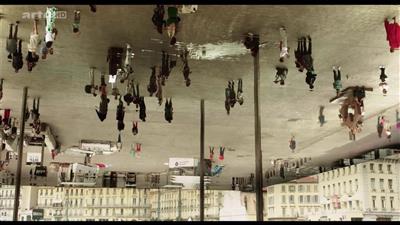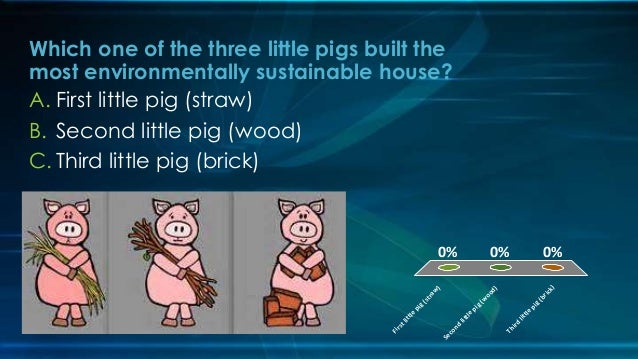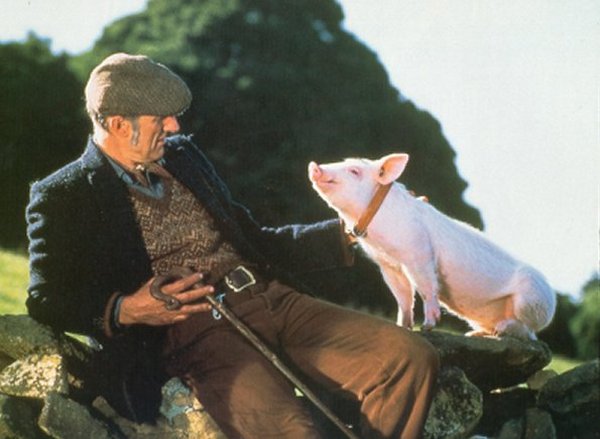A girl wanders by the red-robed Asian man, staring. She comes closer, and then draws away, unable to make out any purpose. A woman also passes by, nervously notices the monk, takes a picture and then giggles, and saunters down the stairs. Many people pass by the Metro stairway, all politely ignoring the monk, avoiding him, pretending not to see him except for the girl, who is still transfixed.
She then hears a male voice clearly state, “Freak.”
She turns to the man, and find that he too is staring, although disinterestedly, at the slow moving monk.
Since he seems to be the only one with any interest in the man, she asks, “Why does he walk so slow?”
The passerby responds, “He is just some crazy Asian.”
Dissatisfied, she asks again, “Why does he walk so deliberately?”
The man spits at the monk’s feet and says, “He’s probably some dirty protester. Wanting to shame us into not walking so quickly, to show off his ability and to demonstrate that we are all heathen for not taking up his disgustingly slow ways.”
Another man stops and speaks. “I have heard of this condition. Oliver Sacks speaks of it. There are people who’s time sense is remarkably different than our own, and while they consider themselves acting and walking at the same time as the rest of us, from our perspective they are standing still, not communicating. From their point of view, we are the ones who cannot stand still, who never finish a conversation.”
“That’s ridiculous,” said the first man. “No one is like that.”
“Well, I suppose you shall have to take that up with Dr. Sacks.” And both men left, one down the stairs, the other up.
 A woman then came close to the girl and spoke quietly to her, “He is a performer. See? He is always striving toward the light. He desires the light, for he desires attention. Because he is in the light, see how the red of his robes reflects and bleeds all over the stairs, creating a symphony of color. He does this, not for any protest, but because he wants to give the rest of us joy.”
A woman then came close to the girl and spoke quietly to her, “He is a performer. See? He is always striving toward the light. He desires the light, for he desires attention. Because he is in the light, see how the red of his robes reflects and bleeds all over the stairs, creating a symphony of color. He does this, not for any protest, but because he wants to give the rest of us joy.”
An Asian woman, dressed in a suit, looking quite proper heard this and said in a clear, loud voice, “He is the Walker. He is the ultimate radical Buddhist.”
“Ha!” said a young female, dressed to the nines. “I don’t think he’s Buddhist. He’s not even human. How can he be? He walks this way for hours—I know, for I saw him on the station earlier today—and he doesn’t cough, doesn’t sneeze, never stumbles, I’m not even certain he breathes. He must be a robot.”
The Asian woman mildly addressed the fab girl, “Have you ever learned a musical instrument?”
“Sure, my mom made me take piano.”
“When you played the piano, in your course of study, did you ever get to the point where you ignored the notes and just played, forgetting all that you were taught about time and pitch and chord and just played because it was in your heart and in forgetting all your lessons, you knew, at that moment, that you had learned them all perfectly, for they were just flowing out of you?”
“I suppose… Yes. Yes, I did. When playing Ode to Joy at times it wasn’t a bunch of notes, but it was real music.”
“That, my dear, is called discipline. It is when a human fully adopts a learned behavior that it becomes second nature to him. We can do it with anything—reading, typing, singing, talking, jumprope, video games—actions that become such a part of us that we do it without thinking, without considering what exactly we are doing. So is this man seemingly ‘not human’, for he is so practiced at his art, his ethic, that he need not consider his actions.
“And yet consider is exactly what he is doing. Little girl, I believe you asked why he is walking so slow? He is doing that because every life is precious. When we walk by quickly, when we speed by in our cars, when we fly in our airplanes, we pass hundreds, thousands even millions of separate living organisms every split second. Some we pass by, some we trod on, some we breathe in, some we simply ignore… because we are moving too fast to take notice.
“This man, the Walker, and those who follow him, are the ones who slow down so that they might have the opportunity to notice every life. To notice the life around us is the first step of compassion. To have compassion is, at the very least, to refrain from taking a life that we might otherwise destroy without even knowing they exist. To have compassion is to recognize the equality of life in an insect, in an amoeba, and giving them their due. The Walker moves slowly so that life may be seen and honored by him. He is the true Buddhist.”
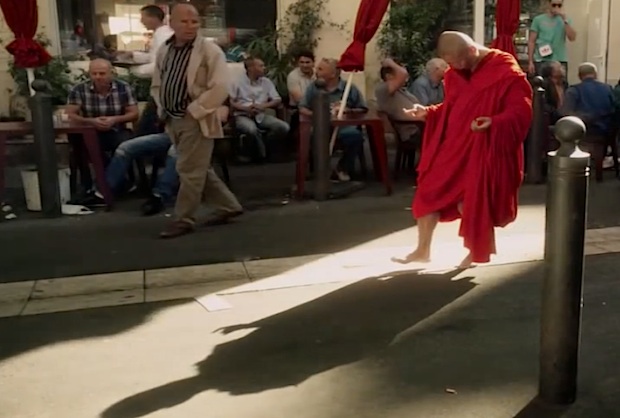 A group of young men stopped and listened to her lecture, and one man at the front asked her, “So are you saying that the best man is the one who is in a coma? The one who never moves, who never eats, but drinks from an IV? Even this monk steps on insects. He just knows he’s doing it. Wouldn’t it be better if he were completely still?”
A group of young men stopped and listened to her lecture, and one man at the front asked her, “So are you saying that the best man is the one who is in a coma? The one who never moves, who never eats, but drinks from an IV? Even this monk steps on insects. He just knows he’s doing it. Wouldn’t it be better if he were completely still?”
“No. For he walks on the earth, not in a hermitage, but in the cities where thousands may see him and consider. If they consider him, perhaps they will consider other life as well. Perhaps they will learn the lesson of slowness and compassion. Some have already taken on this task. He is not just an observer, but a teacher to all who observe.”
And she briskly walks away to her next appointment.
The group of young men looked at each other and laughed uproariously. The leader walked up to the Walker and spoke loudly to him, “So, grandpa, I think what she said was a bunch of horseshit, what do you think?”
The man in red continued his agonizingly slow descent.
“I think this gentlemen needs some help down the stairs, what do you think, men?”
“Certainly. I would love to help the gentleman.”
“Well, fine. I will take this arm, and you take the other.”
They gripped his arms and picked him up. He remained still, as if he were still standing on the stairs. Then one and the other threw his arms forward, causing him to descend the rest of the staircase through the air and land with a hard thump on the concrete pad below.
“Aren’t you grateful? Have you no ‘thank you’ for us?”
The group of five surrounded him, kicking him and beating him, calling him ethnic slurs and filthy names.
Finally, their thirst for violence quenched, they stopped. The leader looked up at the little girl, who saw the whole incident. He cocked his head, tipped his hat and said, “That’s what happens to you when you stand out, you know. Better to just be like everyone else.” And they went their way as the little girl’s tears fell on the concrete.

